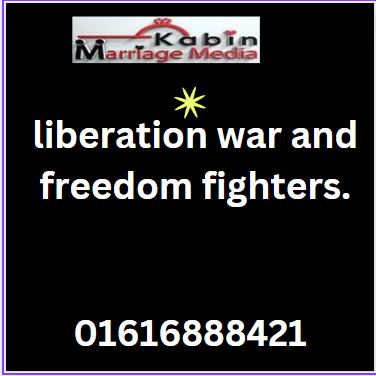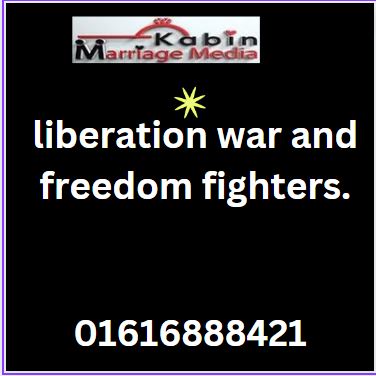liberation war and freedom fighters.
Liberation War and Freedom Fighters: Heroes of Independence
Introduction
The concept of a Liberation War and the valiant Freedom Fighters who wage it is deeply ingrained in the annals of history. Across the globe, countless nations have faced the need to fight for their independence from colonial powers, oppressive regimes, or foreign invaders. This struggle for freedom has often been marked by the indomitable spirit of those who sacrifice their lives for a just cause. In this extensive essay, we will explore the Liberation War and the Freedom Fighters who played an instrumental role in securing independence for their respective nations, drawing from historical examples and the universal principles that underlie these movements.
- Historical Context of Liberation Wars
Liberation wars, often referred to as wars of independence or revolutionary wars, are armed conflicts that are fought primarily to break free from oppressive rule, colonial domination, or foreign occupation. These wars are pivotal moments in a nation’s history, shaping its identity and future trajectory. In many cases, Liberation Wars emerge from long-standing grievances, political, economic, and social inequalities, and the determination of a people to regain their sovereignty. A few significant historical examples serve as a backdrop to our discussion:
1.1 The American Revolution
The American Revolution (1775-1783) is a hallmark example of a successful Liberation War. Thirteen North American colonies of the British Empire rose against British colonial rule, leading to the birth of the United States of America. Key figures like George Washington and Thomas Jefferson played pivotal roles in this war, striving to create a nation grounded in democratic principles and the pursuit of individual rights.
1.2 The French Revolution
The French Revolution (1789-1799) was another watershed moment in world history. Though the primary goal was not necessarily independence, it was a radical uprising that sought to overthrow the oppressive monarchy and aristocracy, setting the stage for the eventual rise of the French Republic. The Revolution’s ideals of liberty, equality, and fraternity became inspirational for freedom movements worldwide.
1.3 The Indian Independence Movement
The Indian Independence Movement, led by figures like Mahatma Gandhi, Jawaharlal Nehru, and Subhas Chandra Bose, aimed at liberating India from British colonial rule. After a prolonged and non-violent struggle, India gained independence in 1947. The Indian Independence Movement stands as a testament to the power of non-violent resistance and mass mobilization.
1.4 The Algerian War of Independence
The Algerian War of Independence (1954-1962) was a protracted struggle against French colonial rule. The National Liberation Front (FLN) led this armed resistance, resulting in the eventual liberation of Algeria from French colonization.
- Role of Freedom Fighters
Freedom Fighters, the brave individuals who actively participate in Liberation Wars, are the linchpin of these movements. They are driven by a deep sense of patriotism, justice, and a burning desire for their nation’s liberation. These individuals endure incredible hardships, make significant sacrifices, and demonstrate unwavering resolve in the face of adversity. The contributions of Freedom Fighters are multifaceted and encompass various domains:
2.1 Leadership
Freedom Fighters often emerge as charismatic leaders, capable of inspiring the masses. Their leadership skills extend beyond the battlefield, as they articulate the vision for an independent nation, forge alliances, and rally support from both domestic and international quarters. George Washington, Ho Chi Minh, and Nelson Mandela exemplify such leadership qualities.
2.2 Military Prowess
Many Freedom Fighters are also skilled military strategists. They are instrumental in planning and executing military operations against the oppressors. Figures like Che Guevara, who fought in various Latin American revolutions, are celebrated for their military acumen.
2.3 Diplomacy
Diplomacy plays a crucial role in Liberation Wars. Freedom Fighters engage in diplomatic efforts to secure support from other nations and international organizations. This support may come in the form of diplomatic recognition, material aid, or political pressure on the oppressors. Diplomatic efforts during the Bangladeshi Liberation War and the Kosovo Liberation Army are illustrative.
2.4 Propaganda
Controlling the narrative is a significant aspect of Liberation Wars. Freedom Fighters often utilize propaganda to garner domestic and international support. This could involve disseminating information about the oppressors’ atrocities or promoting their own cause and ideals. The Cuban Revolution, for instance, leveraged propaganda to rally public opinion.
2.5 Moral Authority
Freedom Fighters often possess a moral authority that transcends the battlefield. Their unwavering commitment to justice, equality, and freedom earns them the respect and admiration of both their followers and the international community. Figures like Mahatma Gandhi and Martin Luther King Jr. are remembered as moral icons of their respective struggles.
-
Challenges Faced by Freedom Fighters
While the role of Freedom Fighters is pivotal in Liberation Wars, they face numerous challenges and obstacles that test their resolve and resourcefulness. Some of the common challenges include:
3.1 Lack of Resources
Freedom Fighters often operate with limited resources compared to the well-funded and equipped oppressors. They must rely on innovation and guerrilla warfare tactics to level the playing field.
3.2 Internal Divisions
Internal divisions within the liberation movement can weaken the struggle. Factionalism, ideological differences, and personal rivalries can undermine the unity and effectiveness of the Freedom Fighters.
3.3 Suppression and Repression
Oppressive regimes use various means, including violence, censorship, and imprisonment, to suppress the Liberation War. Freedom Fighters often operate underground to evade detection and capture.
3.4 International Apathy
Not all Liberation Wars receive international support. The global geopolitical landscape and the interests of powerful nations can influence the level of international aid and recognition a liberation movement receives.
3.5 Psychological and Physical Stress
Freedom Fighters face constant danger, loss of comrades, and the psychological toll of conflict. The physical and emotional strain can be immense.
-
Global Impact of Liberation Wars
Liberation Wars and their Freedom Fighters have a profound global impact, extending beyond the borders of the nations in conflict. These impacts can be seen in various dimensions:
4.1 Spreading Ideals
Liberation Wars often serve as a beacon of hope and inspiration for oppressed people worldwide. The ideals of freedom, justice, and self-determination resonate across borders, motivating others to seek their own liberation.
4.2 Shaping Geopolitics
Successful Liberation Wars can alter the geopolitical landscape, redrawing national boundaries and influencing the power dynamics between nations. The dissolution of colonial empires and the end of the Cold War are examples of such changes.
4.3 Promoting Human Rights
The struggles of Freedom Fighters frequently bring issues of human rights and self-determination to the forefront of international discourse. These movements contribute to the development of international norms and laws that protect these rights.
4.4 Fostering Solidarity
Liberation Wars often create networks of solidarity among oppressed nations. Support for the Algerian War of Independence came from various African and Asian nations, reflecting a broader sentiment against colonialism.
- Case Studies: Prominent Liberation Wars and Their Freedom Fighters
To gain a deeper understanding of the concept of Liberation Wars and the role of Freedom Fighters, it is essential to examine some prominent case studies from different parts of the world.
5.1 The Vietnamese War of Independence


The Vietnamese War of Independence, known in the West as the Vietnam War, is a prime example of a Liberation War against colonial and foreign domination. The war took place from 1955 to 1975 and pitted the North Vietnamese, led by Ho Chi Minh and the National Liberation Front, against the South Vietnamese government, backed by the United States.
Ho Chi Minh, a charismatic leader and a staunch nationalist, played a central role in inspiring the Vietnamese people to resist foreign occupation. The war was characterized by guerilla warfare, a determined populace, and the widespread support of the North Vietnamese government. Despite facing significant challenges, including a superior U.S. military, the Vietnamese Liberation War eventually succeeded, leading to the reunification of North and South Vietnam in 1976.
5.2 The Bangladesh Liberation War
The Bangladesh Liberation War, also known as the Bangladesh War of Independence, was a pivotal conflict that led to the separation of East Pakistan from West Pakistan (now Bangladesh from Pakistan). The war took place in 1971 and was marked by brutal atrocities committed by the Pakistani military against the Bengali population.
Muktijuddhas, or freedom fighters, played a crucial role in the struggle for Bangladesh’s independence. They engaged in both armed combat and a massive non-cooperation movement. Figures like Sheikh Mujibur Rahman, known as the “Father of the Nation,” provided leadership and guidance. The war ended with the surrender of the Pakistani military and the establishment of an independent Bangladesh on December 16, 1971.
5.3 The African National Congress (ANC) and the South African Liberation Struggle
The South African Liberation Struggle against apartheid is a remarkable example of a Liberation War that extended over several decades. The African National Congress (ANC), led by figures like Nelson Mandela, Oliver Tambo, and Walter Sisulu, played a pivotal role in the struggle for racial equality and the end of apartheid.
The ANC’s approach was multifaceted, encompassing both armed struggle and non-violent resistance. While imprisoned, Nelson Mandela became a global symbol of the struggle for justice and equality. The international community’s support for the anti-apartheid movement, through sanctions and diplomatic pressure, significantly contributed to the eventual dismantling of apartheid and the establishment of a democratic South Africa in 1994.
- Lessons Learned from Liberation Wars and Freedom Fighters
Liberation Wars and the Freedom Fighters who lead them provide valuable lessons and insights for nations and individuals striving for justice and freedom. Some of these lessons include:
6.1 The Power of Determination
Liberation Wars are often protracted struggles, and success may not come quickly. The determination to persevere in the face of adversity is a powerful force.
6.2 The Role of Leadership
Effective leadership is critical in any Liberation War. Charismatic and visionary leaders can inspire and unite diverse groups of people toward a common goal.
6.3 The Importance of Ideals
Liberation Wars are fueled by ideals of justice, freedom, and self-determination. These ideals serve as a powerful rallying point for the masses.
6.4 International Support Matters
International support can be a game-changer in Liberation Wars. Solidarity from other nations, diplomatic pressure, and material aid can significantly impact the outcome of the struggle.
6.5 Non-Violent Resistance
While armed struggle is a common feature of Liberation Wars, non-violent resistance, as exemplified by Mahatma Gandhi and Martin Luther King Jr., can also be a potent weapon in the fight for freedom.
- Contemporary Liberation Movements and Freedom Fighters
Liberation Wars are not limited to the pages of history. Even in the contemporary world, various nations and regions continue to grapple with oppression, foreign occupation, and struggles for independence. Some examples include:
7.1 The Kurdish Liberation Movement
The Kurdish people, scattered across several nations in the Middle East, have long sought an independent homeland. Various Kurdish organizations, including the Kurdistan Workers’ Party (PKK) and the Syrian Democratic Forces (SDF), have been at the forefront of this movement, engaging in both armed struggle and diplomatic efforts.
7.2 The Palestinian Liberation Movement
The Palestinian struggle for statehood and self-determination has been a longstanding conflict in the Middle East. Organizations like the Palestine Liberation Organization (PLO) have played a central role in representing the Palestinian people’s aspirations for independence.
7.3 The Tibetan Independence Movement
Tibetans have been engaged in a struggle for independence from Chinese rule for many decades. The Dalai Lama, the spiritual and political leader of Tibet, has been a prominent figure advocating for Tibetan autonomy and freedom.
7.4 The West Papuan Independence Movement
West Papua, a region in Indonesia, has been the site of a protracted struggle for independence. The Free Papua Movement (OPM) and other groups have been at the forefront of this liberation movement, calling for self-determination and independence from Indonesia.
- Conclusion
Liberation Wars and the Freedom Fighters who champion the cause of freedom have left an indelible mark on the course of human history. Their sacrifices, courage, and unwavering commitment to justice and self-determination have reshaped nations and inspired oppressed people worldwide.
muslim matrimony usa


